한식 읽기 좋은 날
Vol 39. Jang
With the Pride of Upholding the Tradition of the Natural Fermentation Method
Grand Master Kang Soonok
When you eat gochujang (red chili paste) as soon as it is made, you can taste its spiciness and sweetness right away. When this gochujang (red chili paste) is fermented, the initial taste of spiciness and sweetness go away, and a clean taste takes their place. As time goes by, the flavor of gochujang (red chili paste) gains depth. When you taste the deepened gochujang (red chili paste), you will see that there is nothing more to add or subtract from “I feel good.”
This is the moment when Grand Master Kang Soonok, who makes jang with the best ingredients and with devotion and heart, is rewarded.
Article. Yoo Seonmi Photo. Choi Choongsik
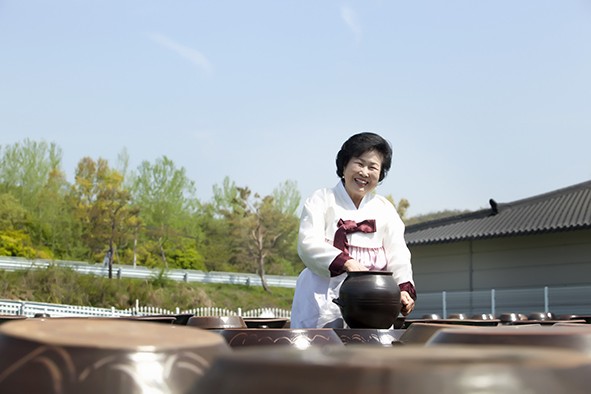
Q. Did you finish making jang this year?
A. Yes. I started making jang from October last year, and finished with the last jang on April 2 this year. I made and dried meju (fermented soybean lump) with 44,000 kg of soybeans last year. The jang I made in January started its fermentation process. (Fatigue?) This is my duty, so I feel proud and rewarded.
Q. You are maintaining the traditional way of making jang.
A. I have been striving to inherit the traditional natural fermentation method. Of course, I will continue to practice it. The same goes for my son, who will succeed me, and my grandchildren who will succeed my son. If I make a compromise, I may be comfortable for a while. But I won’t be able to get approved. Making jang in the traditional way is the pride and honor of a person, who has been making jang for a lifetime.
Q. You personally dry meju (fermented soybean lump) and grow barley malt, right? We know that you personally prepare all the ingredients. And you only use the best ingredients.
A. ganjang (soy sauce) , doenjang (soybean paste), and gochujang (red chili paste) were the essential goods of our household. Our mothers always prepared with devotion when they made jang. Like them, I have to make jang with devotion. This job cannot be done without the maker’s devotion. We always have to make an effort. I always stick to the principle of “All of our traditional jangs are made by hand.”
Q. We believe that you were recognized as the Grand Master of Food because of such committed efforts.
A. I felt so good when I became the grand master. At that moment, I decided to “live my life to the fullest.” I decided to become a person who fits the title of the grand master, and protect the dignity of the grand master.
“This job cannot be done without the maker’s devotion. We always have to make an effort.
I always stick to the principle of “All of our traditional jangs are made by hand.”
This job cannot be done without the maker’s devotion. We always have to make an effort.
I always stick to the principle of “All of our traditional jangs are made by hand.”
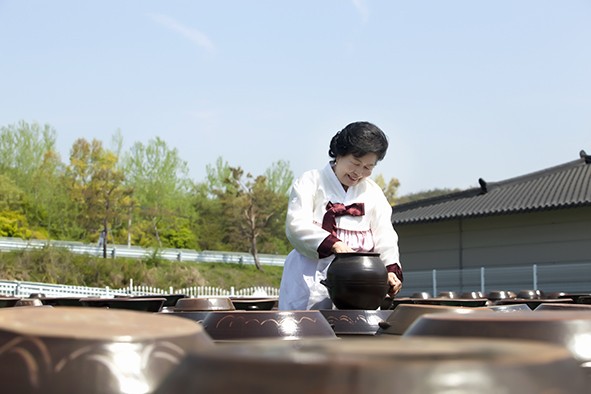
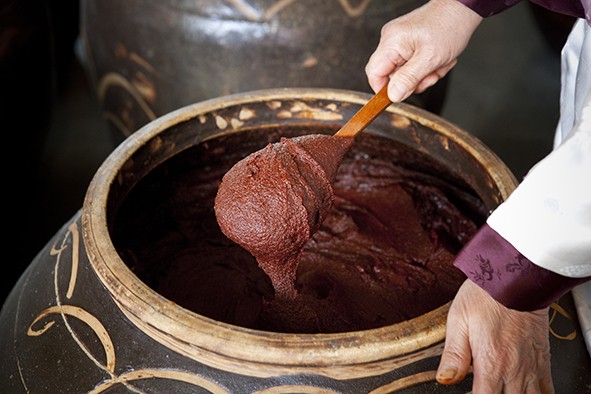
Q. Thanks to the people who have making traditional sauces with all their heart and devotion like you, Korean sauces are now being recognized overseas.
A. Actually, foreigners did not like Korean sauces in the past because they were spicy and salty. However, from some time ago, foreigners have been actively trying to eat Korean jang, and tried tasting them. Over time, many people have been working hard in different places to offer the deep flavor of Korean sauces. Such efforts accumulated one by one, naturally becoming recognized by foreigners.
Q. What kind of effort do you think we have to make to let Korean sauces more known overseas?
A. In 2014, we tried entering foreign markets. So, we visited fairs that were held all over the world, including Japan, China, USA, Canada, etc. However, the reality was different from our expectation. We realized something then. We had to focus on our country. If we wanted to advertise our sauces to the world, we had to capture the palate of our people. Also, I believe that in order to export Korean traditional natural fermented sauces, research on export infrastructure, etc. should be supported.
Q. What do you mean?
A. Actually, there are many restrictions when it comes to exporting the sauces made using traditional natural fermentation methods. As they are naturally fermented, there may be the issues of swelling and content turning sour. Also, the fermentation effect of sauces may vary, depending on the climate of each country. So, I think there is a need for research on how to solve this problem. The probability of naturally fermented products losing their power during export hurts my pride as a jang maker.
Q. You have been continuously studying the flavor of jang until now. And we believe this is the reason Korean sauces are recognized by everyone.
A. Generations change, and their tastes also change. So, I think we should be able to constantly study them, and present a taste that fit the generations.
I once thought that younger generations would not eat traditional pickled vegetables. But I was wrong. They enjoy them very much. It was rewarding to accommodate the changing tastes of today's generations who prefer less salty food. Thus, I will continue to think and conduct research, and protect the duty and dignity of the grand master of food by keeping the tradition of Korean traditional sauces and passing it on well.
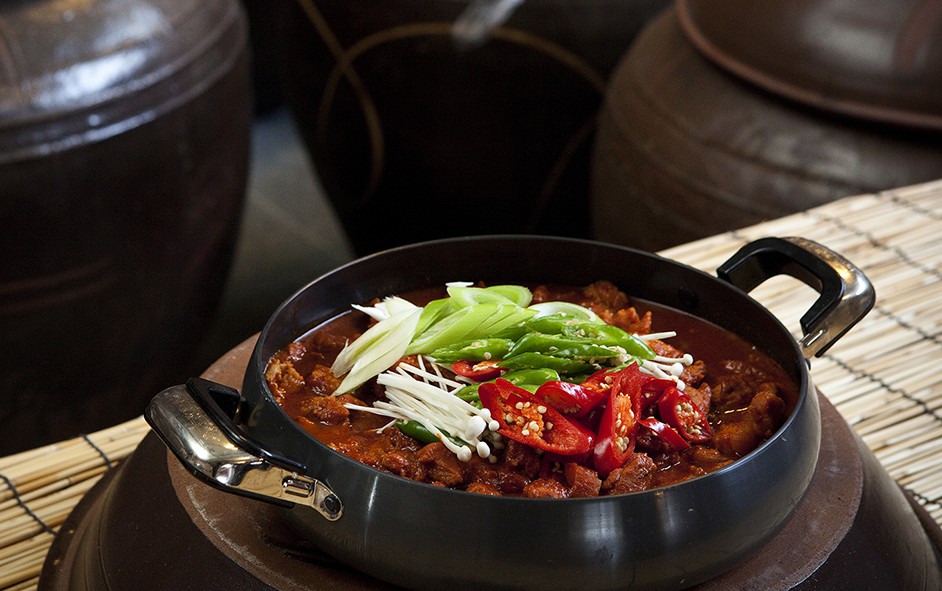
Spicy Gochujangjjigae(Red Chilli Paste Stew)
It was developed as part of the Spicy Taste Project, which Sunchang-gun has been promoting to vitalize the food tourism industry by using Sunchang gochujang (red chili paste). A gochujangjjigae (red chilli paste stew), which was boiled with gochujang (red chili paste) and pork while farming, was reinterpreted as spicy “gochujang bibim (mix) jjigae” that makes the inside of your mouth burn when you eat it. It has less soup than jjigae, and is made like it is stir-fried. Grand Master Kang Soonok showed her skills to the readers of <A Good Day to Read about Korean Food>.
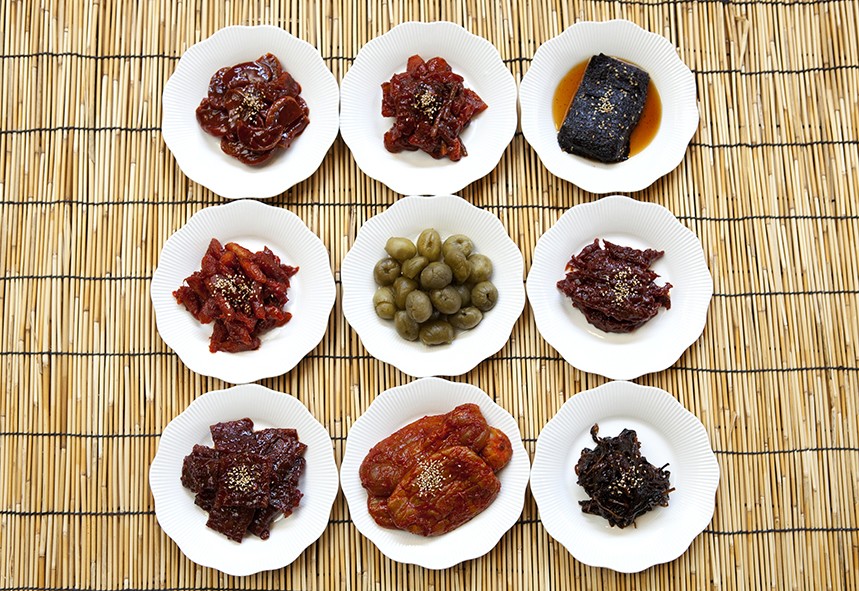
Jangajji(Pickled Vegetables)
What do the Jangajji (pickled vegetables) that Grand Master Kang Soonok made with her traditional naturally fermented jang taste like? “Have some and find out,” said Grand Master Kang with confidence in her flavor.

 한국어
한국어
 English
English






